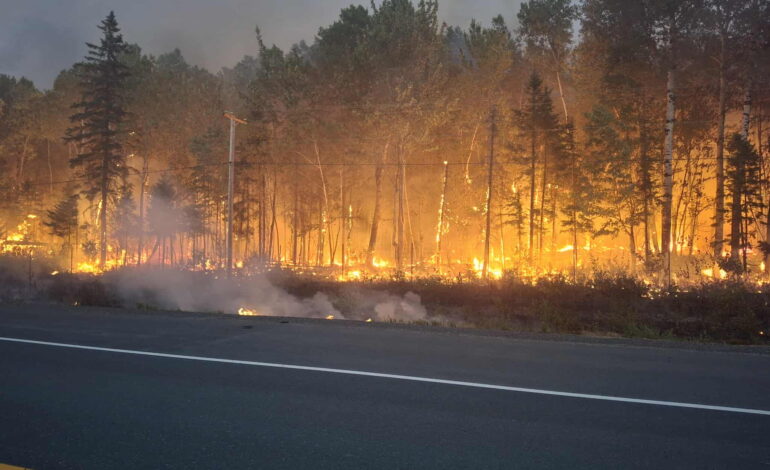
A mutual aid agreement has been signed between Baileyville and St. Stephen for fire response amid a wildland fire being brought under containment by the Maine Forest Service.
“Largely this is being prompted by the fire that is currently in Baileyville,” said St. Stephen Chief Administrative Officer Jeff Renaud. “And making sure we have an adequate response to that fire and quite frankly keep it out of our community if at all possible.”
The agreement is shared between the three communities.
The fire is burning about 4.3 kilometres (2.7 miles) away from the St. Croix River and Little Ridge, a community that is a part of the Municipal District of St. Stephen (MDSS).
“We do have a slightly dated mutual aid agreement with the Calais Fire Department. We do not have one with Baileyville,” Renaud said. “If a call comes for help, we want to try and clean that up, mostly for the protection of our firefighters, if they go over under a legal agreement.”
Renaud explained it makes travelling over the border much easier.
“It’s a very simple, quick and clean agreement that Sean [Morton] and I have put together,” he said. “It has been sent over to our colleagues on the other side and in fact they’ve already signed it and sent it back.”
The council called a special meeting prior to its once-a-month Committee of the Whole meeting to vote on the agreement.
St. Stephen fire chief Sean Morton said since the community grew under New Brunswick’s local government amalgamation, Baileyville is now just as much a neighbour as Calais is.
Morton said there is a similar relationship between Canadian urban fire departments and rural fire departments – each assists each other as necessary.
“They’re an extension of each other,” he said. “Probably even more so on the U.S. side than here, the fire service struggles so the firefighters you see on fires in Baileyville are the same guys you see on fires in Calais.”
St. Stephen Mayor Allan MacEachern said this agreement helps both sides of the border – because there might be a time when St. Stephen needs to call on Maine.
There are currently 5 firefighters from the state of Maine helping battle forest fires in the northeastern part of the province.
Renaud said this agreement won’t just apply to the fire in Baileyville, but be a living document that can be adapted as the two fire departments identify issues.
“We’ll all work together to get things sorted,” Renaud said.
The Maine Department of Agriculture, Conservation and Forestry said the Baileyville fire is about 80 per cent contained with a dozer line around the entire perimeter.
Mop up, the process of removing and extinguishing material around the perimeter of the fire, continues, according to spokesperson Jim Britt.
“At this stage, there is no immediate threat to Charlotte County,” he said in a statement to The Courier. “The fire is now under control. However, residents must remain vigilant, keep emergency preparedness plans ready, and report any new fires.”
He said there has been a long standing tradition of mutual aid agreements among the seven U.S. states and five Canadian provinces.
“It enables resource sharing, such as personnel, equipment, technology, and coordinated fire plans, to tackle fires that exceed any one jurisdiction’s capacity.”
Britt said in places like Baileyville and Charlotte County, it provides the fire departments with greater capacity to fight fires.
The Baileyville fire is not available on New Brunswick’s FireWatch page, but the Natural Resources Minister said the fire centre was in touch with officials in Maine.
He said it is not uncommon to send water bombers and resources to Maine, if needed.




